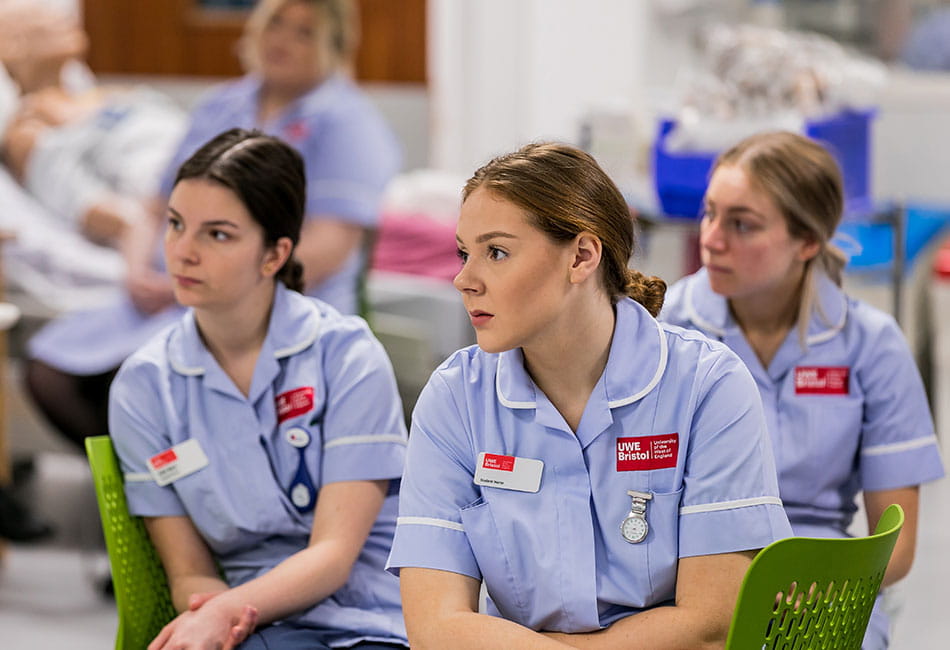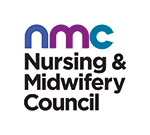
Higher/Degree Apprenticeship Registered Nurse
BSc(Hons) Nursing - four Nursing specialisms
Page last updated 12 February 2024
Introduction
Study our Registered Nursing apprenticeship to gain a specialist degree in your chosen field of nursing, which you'll need to register as a professional nurse. Benefit from UWE Bristol's long-standing industry links and excellent reputation for nursing courses.
Why study for a Registered Nurse apprenticeship?
Our Registered Nurse apprenticeship (Level 6) enables you to complete your professional nurse education, while continuing in your current role. Learners looking to take the next step in their training can benefit from this employer-funded training option, to demonstrate a greater depth of knowledge and advanced skills, confidence and competence.
Over the course of four years, you'll receive education validated against the Nursing and Midwifery Council's (NMC) (2018) standards. This includes theory and practice-based learning in your chosen field of nursing: adult, children and young people, learning disabilities or mental health.
Regular review meetings ensure you stay on track academically and in practice, and develop as a caring, competent and critically thinking nurse. By the end of the course, you'll be equipped to meet people's specific care needs, working with adults, children, or those with learning difficulties or mental health needs.
Why UWE Bristol?
Drawing on long-standing links with the NHS, and private and voluntary sector providers, UWE Bristol has an excellent reputation for its nursing courses. This apprenticeship draws on our strengths in developing sustainable, employer-led nursing courses, enriched by the latest in best practice and clinical understanding.
You'll learn using a range of interactive learning methods, technology and innovative simulation facilities, ensuring you'll achieve the fundamental skills for your chosen practice area. This also ensures you're able to problem solve, assess, coordinate, make informed complex decisions, and lead and transform care.
You'll complete a year-long placement in years one and two, two placements in years three and four, and off-the-job learning in different departments. This means you'll spend about half the course applying your knowledge and building your professional skills in a range of settings. We have excellent links with local employers, and placements are normally split between NHS roles and positions in private or voluntary sector organisations.
Benefits to your employer
The Registered Nurse apprenticeship offers a new way for your employer to plan for your role in their future workforce. This apprenticeship supports the training of Registered Nurse Degree Apprentices (RNDAs) and the career progression of Assistant Practitioners (APs) and Nursing Associates (NAs) to become Registered Nurses.
As you develop the NMC skills and proficiencies to practice, your employer will benefit from your expertise, with all your tuition fees fully funded via an apprenticeship. By investing in your nurse education, your employer will upskill you as a member of staff while retaining your talents in-house.
It's a flexible and practical way to invest in your professional development, and to address any potential skills gaps in your current team. With access to the latest practice-led education, you'll develop as a competent, well-rounded practitioner, with strong professional values, identity and person-centred approach.
Your employer will have the full support of UWE Bristol's experienced academic community. They'll also benefit from our strong reputation and expertise in nursing, and our extensive links with healthcare trusts and providers. So you'll be supported to make an even greater contribution to your department.
For further information, please read FAQs for Registered Nursing Degree Apprentices, Employers and Educators (PDF).
Careers
In addition to supporting your development in the workplace, this apprenticeship will help you to understand the career landscape in your sector and plan for your longer-term ambitions. Our award-winning Careers Service is on hand to give you independent advice and guidance at any point in your studies.
Course details
Content
The Registered Nurse apprenticeship is mapped to the proficiencies set out by the NMC (2018).
This programme is organised as a day-release course.
Indicative content:
- Preparation for professional practice
- Physiology, pharmacology and public health
- Complexities of health
- Evidenced-based pharmacology
- Assessment and clinical reasoning
- Healthcare research methods
- Leadership and supervision
- Placement learning
- Final project.
You'll take part in simulation activities, lectures, group work, and directed and self-directed learning.
Learning and Teaching
This course has a strong practical focus, allowing you to gain competence carrying out the hands-on tasks you'll perform in your career. About half your time will be spent on placements.
You'll have access to all the support and facilities you need, including our Skills Simulation Suite. This includes an imitation ward where you'll develop your clinical expertise in a safe, instructive environment.
See our glossary of teaching and learning terms.
Assessment
Assessment takes the form of continuous clinical practice assessment, written assignments, case studies, Objective Structured Clinical Examinations (OSCEs), project/portfolio work, timed examinations and presentations. In your final year, you'll complete a dissertation.
Learn more about assessments.
Features
Professional accreditation
On successful completion of this apprenticeship, you'll be able to register to practise as a professional nurse with the Nursing and Midwifery Council (NMC). You'll achieve a BSc(Hons) Nursing degree in your chosen specialism and will graduate with one of the following:
- BSc(Hons) Nursing (Adult)
- BSc(Hons) Nursing (Children and Young People)
- BSc(Hons) Nursing (Learning Disabilities)
- BSc(Hons) Nursing (Mental Health).
Life
Health and Wellbeing
We provide support in the way you need it.
Bristol
A stunning city for student living with all the qualities to make you want to stay.
Sports, societies and activities
There is more to your experience here than study. Choose to make the most of it and try new things.
Sustainability
It is embedded in our culture, teaching and research.
Campus and facilities
Discover our campuses and the wealth of facilities provided for our students.
Entry
Typical offers
- Tariff points: 112
- GCSE: Grade C/4 or above in English and Mathematics or equivalent (we accept Functional Skills Level 2 in Maths and English).
- A-level subjects: No specific subjects required.
- EDEXCEL (BTEC) Diploma: No specific subjects required.
- Access: No specific subjects required.
- Baccalaureate IB: No specific subjects required.
- Irish Highers: No specific subjects required.
- T Levels: No specific subjects required.
Entry requirements
We welcome applications from candidates from a wide variety of backgrounds, therefore we will consider those with equivalent qualifications or professional experience where the above requirements are not met.
All applicants need to be employed in a relevant nursing role.
We use the UCAS Tariff system to make offers to applicants. You can use the UCAS Tariff Calculator to convert your qualifications and grades into points.
In addition, all applicants are required to complete:
- Health assessment, declaration and vaccinations - applicants must be in good health and be up to date with routine immunisations (for example, tetanus, diphtheria, polio and MMR). Employers are responsible for ensuring this can be evidenced at the start of the course. Applicants will also be required to confirm their status in respect of several infectious diseases and immunisations (tuberculosis, measles, mumps, rubella, chicken pox, varicella, hepatitis B, hepatitis C, HIV antibodies) and be prepared to have all required vaccinations funded by the employer. If vaccinations are not up to date, this will affect ability to continue the course. Concerns with regards to vaccinations should be raised at the point of application.
- Disclosure of criminal background - applicants are required to complete a Disclosure and Barring Service (DBS) enhanced check with UWE Bristol. Offers of a place will be subject to the disclosure of criminal background. The Rehabilitation of Offenders Act 1974 does not apply, and all convictions, including those which are spent, must be disclosed. This is in accordance with the Rehabilitation of Offenders Act 1974 (Exceptions) Order 1975.
Interview
All candidates are considered on an individual basis. Shortlisted candidates will be invited to attend an interview.
Accredited Learning and Accredited Experiential Learning
If you are looking for advanced entry onto this course, such as starting in year three of the four year course, you may be able to gain accreditation for prior learning from another institution (Accredited Learning) or you may be able to get credit for learning achieved through experience that may not be formally certificated (Accredited Experiential Learning).
If you are wanting to be considered for Accredited Experiential Learning (AEL) please note that our minimum entry requirements still apply.
ESFA eligibility requirements
To study an apprenticeship, you need to:
- be aged 16 years or over
- be an EEA citizen (with Right to Work in the UK) and not be in any other kind of full-time education (including being enrolled on any other apprenticeship programme)
- be employed (for at least the full planned duration of your apprenticeship) in a role that is linked to the appropriate industry for the apprenticeship training
- receive at least legal minimum wage for apprentices (wages vary depending on experience, employer and level or type of apprenticeship)
- commit to at least 6 hours per week of apprenticeship training during your normal working hours
- have support from your employer, including a mentor/line manager. Your employer is also responsible for funding your apprenticeship.
More information about eligibility for apprenticeship funding is available on the GOV.UK website.
How to apply
Employed
If you’re interested in applying and have the support from your employer, speak to your line manager and/or HR team in the first instance for approval. Your employer will contact us so we can send you an application link.
Unemployed
If you’re not employed, you can use the following tools to find an apprenticeship vacancy with an employer:
- Employer’s careers page
- Find an Apprenticeship
- UCAS Apprenticeship search
For more guidance on higher and degree apprenticeship applications.
For further information
For course-specific enquiries, please contact the Programme Leader.
For all other enquiries, please email our Apprenticeship Hub apprenticeships@uwe.ac.uk or call +44 (0)117 32 84888.
For further information about Higher and Degree Apprenticeships.
